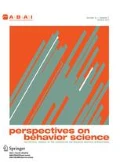References
Coles, A. S., Kozak, K., & George, T. P. (2018). A review of brain stimulation methods to treat substance use disorders. American Journal on Addictions, 27(2), 71–91. https://doi.org/10.1111/ajad.12674.
Cooper, J. O., Heron, T. E., & Heward, W. L. (2007). Applied behavior analysis (2nd ed.). Upper Saddle River, NJ: Pearson.
Darwin, C. (1859). On the origin of species. New York, NY: Sterling.
Dougher, M. (2013). Behaviorisms and private events. The Behavior Analyst, 36, 223–227.
Ghiselin, M. T. (2018). B. F. Skinner and the metaphysics of Darwinism. Perspectives on Behavior Science, 41, 269–281.
Heward, W. L., & Chance, P. C. (2010). Introduction: dealing with what is. The Behavior Analyst, 33, 145–151.
Ninness, C., Ninness, S. K., Rumph, M., & Lawson, D. (2017). The emergence of stimulus relations: human and computer learning. Perspectives on Behavior Science, 41, 121–154. https://doi.org/10.1007/s40614-017-0125-6.
O’Donohue, W., & Szymanski, J. (1996). Skinner on cognition. Journal of Behavioral Education, 6, 35–48.
Raup, D. M. (1991). Extinction: bad genes or bad luck? New York, NY: Norton.
Richelle, M. N. (1993). B. F. Skinner: a reappraisal. Mahwah, NJ: Laurence Erlbaum Associates.
Schneider, S. M. (2012). The science of consequences. How they affect genes, change the brain, and impact our world. Amherst, NY: Prometheus.
Silva, M. T. A., Goncalves, F. L., & Garcia-Mijares, M. (2007). Neural events in the reinforcement contingency. The Behavior Analyst, 30, 17–30.
Skinner, B. F. (1938). The behavior of organisms. New York, NY: Appleton-Century-Crofts.
Skinner, B. F. (1974). About behaviorism. New York, NY: Knopf.
Skinner, B. F. (1977). Why I am not a cognitive psychologist. Behaviorism, 5, 1–10.
Teitelbaum, P., & Epstein, A. N. (1962). The lateral hypothalamic syndrome: recovery of feeding and drinking after lateral hypothalamic lesions. Psychological Review, 69, 74–90.
Zilio, D. (2016). Who, what and when: Skinner’s critiques of neuroscience and his main targets. The Behavior Analyst, 39, 197–218.
Author information
Authors and Affiliations
Corresponding author
Rights and permissions
About this article
Cite this article
Axelrod, S. Learning without Brains: a Review of The Hidden Life of Trees: What They Feel, How They Communicate by Peter Wohleben. Perspect Behav Sci 41, 465–469 (2018). https://doi.org/10.1007/s40614-018-0172-7
Published:
Issue Date:
DOI: https://doi.org/10.1007/s40614-018-0172-7

